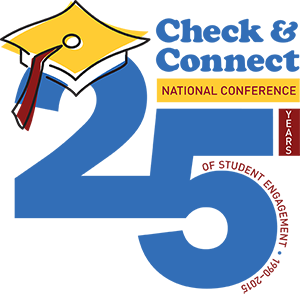

Main navigation | Main content

The following concurrent sessions – one of four themed tracks – took place at Check & Connect's first national conference, and slides from specific sessions are available below.
David R. Johnson, Ph.D., Birkmaier Professor of Educational Leadership & Director, Institute on Community Integration, University of Minnesota
Efforts to prevent students from dropping out of school require resources. Administrators and staff need good information on the costs as well as the effectiveness of dropout prevention interventions. This information is essential in establishing and sustaining these intervention programs. Accurately assessing the costs of dropout prevention programs can, however, be challenging. This presentation will describe various approaches to calculating program intervention costs based on the "ingredients" and "resource cost model" methods. By focusing on ingredients or resources costs, these approaches begin not with a budget, but rather with the details of the intervention and its resource requirements, thus producing a more accurate understanding of the costs associated with intervention implementation.
Richelle Dumas, Student Assistance Consultant, Metropolitan School District Pike Township, IN
Kathryn Szwed-Thompson, District Behavior Consultant, Metropolitan School District Pike Township, IN
The Metropolitan School District of Pike Township is utilizing Check & Connect Program district-wide to provide supports for middle school students with challenging behavior that impact their academic performance and are identified through the Response to Instruction model. This presentation will share the implementation steps utilized to begin the program at 3 middle schools and the next steps for beginning the program at the high school level.
W. Carl Sumi, Ph.D., Senior Education Researcher, SRI International
Nicole Fabrikant, MSW, Researcher, SRI International
Darcy Cabral, MSW, Program Coordinator, SRI International
Effective mentors are essential to successful implementation of C&C and high turnover can negatively affect student outcomes. This presentation will describe a 3 year study of C&C where all the original mentors were retained for the entirety of the project. We will discuss procedures and processes that include hiring, training, supervising, and supporting the mentors over the course of the study. We also will share data that illustrate the effectiveness of the mentors in the project.
Karen Storm, Ph.D., Research Associate, Center for Early Education and Development, University of Minnesota
Jane Fields, Ph.D., Research Associate, Center for Applied Research and Educational Improvement, University of Minnesota
Melissa Haynes, Ph.D., Coordinator, Minnesota Evaluation Studies Institute
The question of whether Check & Connect is making a difference in a school, district, or state is both an important and complex one. In this panel presentation, three seasoned evaluators will bring different perspectives to bear on how to answer it. Dr. Haynes will contribute the evaluation theorist perspective. Dr. Storm, will discuss contextual issues related to research on Check & Connect, and Dr. Fields, will discuss the inherent complexities of evaluating in the school setting.
Cammy Lehr, Ph.D., GradMinnesota Project Manager, Minnesota Alliance With Youth
Eileen Klemm, M.A., Check & Connect Project Coordinator & Trainer, Institute on Community Integration, University of Minnesota
Sandy Schmitz, Ph.D., Research Associate, Institute on Community Integration, University of Minnesota
How does the Check & Connect model relate to state level initiatives such as GradMinnesota and State Systemic Improvement Plans? Find the answer in this two part session. First you will learn about GradMinnesota and the relevance of Check & Connect as an effective strategy to engage children and young people in school and learning. GradMinnesota is an initiative of Minnesota Alliance With Youth, Minnesota Department of Education, and the Office of the Governor. Second, you will learn how Check & Connect fits within an SSIP framework Topics addressed will include implementation science, root cause analysis, theory of action, and evaluation in the scaling-up of Check & Connect at the state level. All states are required to submit SSIPs to the Office of Special Education (OSEP) on an annual basis.